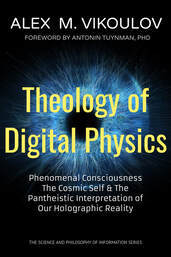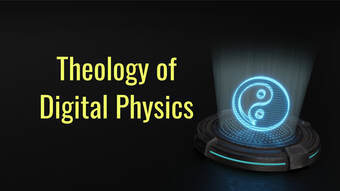Rethinking the Hard Problem of Consciousness from the Holistic Perspective of Digital Physics
by Alex Vikoulov  "Science cannot solve the ultimate mystery of Nature. And that is because, in the last analysis, we ourselves are a part of the mystery that we are trying to solve."
"Science cannot solve the ultimate mystery of Nature. And that is because, in the last analysis, we ourselves are a part of the mystery that we are trying to solve."
-Max Planck
The following excerpt from my upcoming book Theology of Digital Physics: Phenomenal Consciousness, The Cosmic Self & The Pantheistic Interpretation of Our Holographic Reality may be hard to swallow for some die-hard materialists. This is why I urge some of you to read it with an open mind and abstain from making hasty conclusions. Keep in mind that this excerpt is but a small sample of much larger discussion of the hard problem of consciousness covered quite extensively in my book with the "meta-analysis" of leading theories of consciousness, substantiated claims, certain proposed solutions in regards to phenomenology, future possibilities of mind-uploading and, as the title suggests, theological implications of Digital Physics.
 First, we need to recognize that the physicalist approach is limited in scope and can only depict neural correlates of consciousness without identifying the causal role of biochemical processes on producing a conscious experience. This is a very old mind-body debate deeply rooted in the debate of Idealism vs. Materialism. Arguably, consciousness is not generated by the brain. You can’t get consciousness out of a piece of matter. We have discussed elsewhere the many reasons why we can be certain that this is true. Consciousness is fundamental, pre-exists our Universe and manifests in everything that we think of as real. A brain, as important as it seems, is nothing more than the way that non-local consciousness operates at an "avatar" level during a lifetime. The evidence that all of this is true is consistent and overwhelming. But mainstream science is still bound by the centuries-old “materialist dogma” and stuck with the “hard problem” of consciousness.
First, we need to recognize that the physicalist approach is limited in scope and can only depict neural correlates of consciousness without identifying the causal role of biochemical processes on producing a conscious experience. This is a very old mind-body debate deeply rooted in the debate of Idealism vs. Materialism. Arguably, consciousness is not generated by the brain. You can’t get consciousness out of a piece of matter. We have discussed elsewhere the many reasons why we can be certain that this is true. Consciousness is fundamental, pre-exists our Universe and manifests in everything that we think of as real. A brain, as important as it seems, is nothing more than the way that non-local consciousness operates at an "avatar" level during a lifetime. The evidence that all of this is true is consistent and overwhelming. But mainstream science is still bound by the centuries-old “materialist dogma” and stuck with the “hard problem” of consciousness.
If we assume that consciousness doesn’t arise from the brain activity, as some neuroscientists still presume to be true, where does it come from? Some thinkers propose that “local” consciousness arises from “non-local” quantum processes at large while consciousness is posited to be Nature’s sole ontological primitive. Besides the Unified Field, I use the term Quantum Akasha in the book, bridging perennial theosophy and modern quantum theory. British-American philosopher Peter Russell refers to the Primacy of Consciousness, cognitive scientist Donald Hoffman puts forth the notion of Conscious Realism, and idealist philosopher Bernardo Kastrup defends Metaphysical Idealism.
To use the metaphor of our Information Age, consciousness to humans is as Cloud to computers. Just like your smartphone, your brain is a 'bio'-logical computing device of your mind, an interface for physical reality. Our minds are embedded into the greater mind-network, as computers in the Cloud. Viewed in this way, consciousness is 'non-local' Cloud, our brain-mind systems are receivers, processors and transmitters of information within that Cloud.
I wouldn't be surprised if all that hype about testing for the 'seat of consciousness' could only end up refining our understanding of neural correlates -- not how consciousness originates in the brain because it's not its origin there. The Internet or a cellular network is not generated by your smartphone -- only processed by it. Species-wide mind-networks are ubiquitous in Nature. What's different with humans is that the forthcoming cybernetic mediation is about to become synthetic telepathy and beyond that -- the emergence of one global mind, the 'Syntellect Emergence'.
Perhaps what would pull the rug from under physicalism is a notion of ever deeper levels of abstraction that only minds can create and perceive. Physicalists might make a concession by saying that information, now widely accepted as fundamental, is physical but idealists would insist by saying that information, conveyed by symbolism, originates only in the mind. Video: What is information? w/Alex Vikoulov - Ecstadelic Media (cc)
Intersubjectivity is particularly a great example of layered abstractions, from memes to social institutions to collective unconscious well beyond materiality. Subjective values, such as patriotism, and complex concepts are inherently mental in nature. What’s even more indicative that our world is entirely mental rather than physical is that advanced consciousness like augmented humans and artificial superintelligence will generate even deeper levels of abstraction from extradimensionalities to virtualities of our own design. Quantum computers would compute parallel slices of abstraction. And inner space exploration could eclipse outer space exploration. Before long, we’ll start to create new virtual worlds coming right out of our imagination, instantly “materialized” with a help of advanced AI.
Would it be logical to accept that it has already happened in our bi-directionally causal (self-causal, retrocausal) Universe and our human mindspace is but a fractal of the larger cosmic mind? In a real sense, we all belong to levels of abstraction with top-down propagation emanating from the Omega Point, the transcendental projector of all possible observer timelines. All mass-energy, space-time itself emerge from consciousness. Those are epiphenomena of consciousness. Period. As Arthur Eddington once put it, the stuff of the Universe is mind-stuff.
Also, speaking of levels of abstraction consider that what we perceive as physical well may be imaginary in the minds of inhabitants of parallel Earth where events turn out slightly different from ours, hinting once again that everything is made of information and ultimately is but a mental construct.
-Alex Vikoulov
 P.S. "Theology of Digital Physics: Phenomenal Consciousness, The Cosmic Self & The Pantheistic Interpretation of Our Holographic Reality" is now available to pre-order on Amazon! Release date: November 25, 2019. This new book is adapted to general audience from The Syntellect Hypothesis published earlier this year and part of The Science and Philosophy of Information book series. Written by Alex M. Vikoulov; Foreword by Antonin Tuynman, PhD; Format: Kindle eBook; Print Length: 325 pages; Price: $9.99.
P.S. "Theology of Digital Physics: Phenomenal Consciousness, The Cosmic Self & The Pantheistic Interpretation of Our Holographic Reality" is now available to pre-order on Amazon! Release date: November 25, 2019. This new book is adapted to general audience from The Syntellect Hypothesis published earlier this year and part of The Science and Philosophy of Information book series. Written by Alex M. Vikoulov; Foreword by Antonin Tuynman, PhD; Format: Kindle eBook; Print Length: 325 pages; Price: $9.99.
Pre-order now and get your copy auto-delivered to your device on Nov. 25, 2019:
https://www.amazon.com/dp/B081DN7W1K
Tags: rethinking hard problem of consciousness, hard problem of consciousness, digital physics, holistic perspective, theology, theology of digital physics, digital theology, digital pantheism, holism, holographic reality, holographic principle, phenomenal consciousness, cosmic self, transcendent self, self-transcendence, theogenesis, cybernetic singularity, syntellect emergence, intelligence supernova, artificial superintelligence, Syntellect Hypothesis, Antonin Tuynman, Alex Vikoulov, primacy of consciousness, perceptronium, noocentrism, digital theologian, cosmic consciousness, quantum mechanics, Arthur Eddington, Max Plsnck,Perter Russell, Donald Hoffman, Bernardo Kastrup, conscious realism, metaphysical idealism, Omega Point, cosmic mind, quantum theory
* Image Credit: Shutterstock
About the Author:
Alex Vikoulov is a futurist, digital philosopher, neo-transcendentalist, cosmist, transhumanist singularitarian, consciousness researcher, evolutionary cyberneticist, essayist, media commentator, painter, author of "The Syntellect Hypothesis: Five Paradigms of the Mind's Evolution," "The Origins of Us: Evolutionary Emergence and The Omega Point Cosmology," "The Physics of Time: D-Theory of Time & Temporal Mechanics," "The Intelligence Supernova: Essays on Cybernetic Transhumanism, The Simulation Singularity & The Syntellect Emergence" (2019). Lives in Burlingame, California (San Francisco Bay Area). More Bio...
e-mail: alexvikoulov@ecstadelic.net
Follow us ↴
 "Science cannot solve the ultimate mystery of Nature. And that is because, in the last analysis, we ourselves are a part of the mystery that we are trying to solve."
"Science cannot solve the ultimate mystery of Nature. And that is because, in the last analysis, we ourselves are a part of the mystery that we are trying to solve." -Max Planck
The following excerpt from my upcoming book Theology of Digital Physics: Phenomenal Consciousness, The Cosmic Self & The Pantheistic Interpretation of Our Holographic Reality may be hard to swallow for some die-hard materialists. This is why I urge some of you to read it with an open mind and abstain from making hasty conclusions. Keep in mind that this excerpt is but a small sample of much larger discussion of the hard problem of consciousness covered quite extensively in my book with the "meta-analysis" of leading theories of consciousness, substantiated claims, certain proposed solutions in regards to phenomenology, future possibilities of mind-uploading and, as the title suggests, theological implications of Digital Physics.
 First, we need to recognize that the physicalist approach is limited in scope and can only depict neural correlates of consciousness without identifying the causal role of biochemical processes on producing a conscious experience. This is a very old mind-body debate deeply rooted in the debate of Idealism vs. Materialism. Arguably, consciousness is not generated by the brain. You can’t get consciousness out of a piece of matter. We have discussed elsewhere the many reasons why we can be certain that this is true. Consciousness is fundamental, pre-exists our Universe and manifests in everything that we think of as real. A brain, as important as it seems, is nothing more than the way that non-local consciousness operates at an "avatar" level during a lifetime. The evidence that all of this is true is consistent and overwhelming. But mainstream science is still bound by the centuries-old “materialist dogma” and stuck with the “hard problem” of consciousness.
First, we need to recognize that the physicalist approach is limited in scope and can only depict neural correlates of consciousness without identifying the causal role of biochemical processes on producing a conscious experience. This is a very old mind-body debate deeply rooted in the debate of Idealism vs. Materialism. Arguably, consciousness is not generated by the brain. You can’t get consciousness out of a piece of matter. We have discussed elsewhere the many reasons why we can be certain that this is true. Consciousness is fundamental, pre-exists our Universe and manifests in everything that we think of as real. A brain, as important as it seems, is nothing more than the way that non-local consciousness operates at an "avatar" level during a lifetime. The evidence that all of this is true is consistent and overwhelming. But mainstream science is still bound by the centuries-old “materialist dogma” and stuck with the “hard problem” of consciousness.If we assume that consciousness doesn’t arise from the brain activity, as some neuroscientists still presume to be true, where does it come from? Some thinkers propose that “local” consciousness arises from “non-local” quantum processes at large while consciousness is posited to be Nature’s sole ontological primitive. Besides the Unified Field, I use the term Quantum Akasha in the book, bridging perennial theosophy and modern quantum theory. British-American philosopher Peter Russell refers to the Primacy of Consciousness, cognitive scientist Donald Hoffman puts forth the notion of Conscious Realism, and idealist philosopher Bernardo Kastrup defends Metaphysical Idealism.
To use the metaphor of our Information Age, consciousness to humans is as Cloud to computers. Just like your smartphone, your brain is a 'bio'-logical computing device of your mind, an interface for physical reality. Our minds are embedded into the greater mind-network, as computers in the Cloud. Viewed in this way, consciousness is 'non-local' Cloud, our brain-mind systems are receivers, processors and transmitters of information within that Cloud.
I wouldn't be surprised if all that hype about testing for the 'seat of consciousness' could only end up refining our understanding of neural correlates -- not how consciousness originates in the brain because it's not its origin there. The Internet or a cellular network is not generated by your smartphone -- only processed by it. Species-wide mind-networks are ubiquitous in Nature. What's different with humans is that the forthcoming cybernetic mediation is about to become synthetic telepathy and beyond that -- the emergence of one global mind, the 'Syntellect Emergence'.
Perhaps what would pull the rug from under physicalism is a notion of ever deeper levels of abstraction that only minds can create and perceive. Physicalists might make a concession by saying that information, now widely accepted as fundamental, is physical but idealists would insist by saying that information, conveyed by symbolism, originates only in the mind. Video: What is information? w/Alex Vikoulov - Ecstadelic Media (cc)
Intersubjectivity is particularly a great example of layered abstractions, from memes to social institutions to collective unconscious well beyond materiality. Subjective values, such as patriotism, and complex concepts are inherently mental in nature. What’s even more indicative that our world is entirely mental rather than physical is that advanced consciousness like augmented humans and artificial superintelligence will generate even deeper levels of abstraction from extradimensionalities to virtualities of our own design. Quantum computers would compute parallel slices of abstraction. And inner space exploration could eclipse outer space exploration. Before long, we’ll start to create new virtual worlds coming right out of our imagination, instantly “materialized” with a help of advanced AI.
Would it be logical to accept that it has already happened in our bi-directionally causal (self-causal, retrocausal) Universe and our human mindspace is but a fractal of the larger cosmic mind? In a real sense, we all belong to levels of abstraction with top-down propagation emanating from the Omega Point, the transcendental projector of all possible observer timelines. All mass-energy, space-time itself emerge from consciousness. Those are epiphenomena of consciousness. Period. As Arthur Eddington once put it, the stuff of the Universe is mind-stuff.
Also, speaking of levels of abstraction consider that what we perceive as physical well may be imaginary in the minds of inhabitants of parallel Earth where events turn out slightly different from ours, hinting once again that everything is made of information and ultimately is but a mental construct.
-Alex Vikoulov
 P.S. "Theology of Digital Physics: Phenomenal Consciousness, The Cosmic Self & The Pantheistic Interpretation of Our Holographic Reality" is now available to pre-order on Amazon! Release date: November 25, 2019. This new book is adapted to general audience from The Syntellect Hypothesis published earlier this year and part of The Science and Philosophy of Information book series. Written by Alex M. Vikoulov; Foreword by Antonin Tuynman, PhD; Format: Kindle eBook; Print Length: 325 pages; Price: $9.99.
P.S. "Theology of Digital Physics: Phenomenal Consciousness, The Cosmic Self & The Pantheistic Interpretation of Our Holographic Reality" is now available to pre-order on Amazon! Release date: November 25, 2019. This new book is adapted to general audience from The Syntellect Hypothesis published earlier this year and part of The Science and Philosophy of Information book series. Written by Alex M. Vikoulov; Foreword by Antonin Tuynman, PhD; Format: Kindle eBook; Print Length: 325 pages; Price: $9.99.Pre-order now and get your copy auto-delivered to your device on Nov. 25, 2019:
https://www.amazon.com/dp/B081DN7W1K
Tags: rethinking hard problem of consciousness, hard problem of consciousness, digital physics, holistic perspective, theology, theology of digital physics, digital theology, digital pantheism, holism, holographic reality, holographic principle, phenomenal consciousness, cosmic self, transcendent self, self-transcendence, theogenesis, cybernetic singularity, syntellect emergence, intelligence supernova, artificial superintelligence, Syntellect Hypothesis, Antonin Tuynman, Alex Vikoulov, primacy of consciousness, perceptronium, noocentrism, digital theologian, cosmic consciousness, quantum mechanics, Arthur Eddington, Max Plsnck,Perter Russell, Donald Hoffman, Bernardo Kastrup, conscious realism, metaphysical idealism, Omega Point, cosmic mind, quantum theory
* Image Credit: Shutterstock
About the Author:
Alex Vikoulov is a futurist, digital philosopher, neo-transcendentalist, cosmist, transhumanist singularitarian, consciousness researcher, evolutionary cyberneticist, essayist, media commentator, painter, author of "The Syntellect Hypothesis: Five Paradigms of the Mind's Evolution," "The Origins of Us: Evolutionary Emergence and The Omega Point Cosmology," "The Physics of Time: D-Theory of Time & Temporal Mechanics," "The Intelligence Supernova: Essays on Cybernetic Transhumanism, The Simulation Singularity & The Syntellect Emergence" (2019). Lives in Burlingame, California (San Francisco Bay Area). More Bio...
e-mail: alexvikoulov@ecstadelic.net
Follow us ↴
Published on November 16, 2019 00:00
No comments have been added yet.



